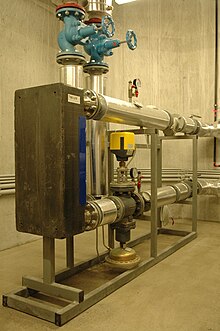District heating substation


A district heating substation is a component in a district heating system that connects the main network to a building's own heating system.[1][2][3]
Parts
The station normally has one or more of the following parts:
- Heat exchanger - to split primary and secondary side of the system
- Control valve - to regulate the flow through the heat exchanger
- Heat meter - to measure energy consumption and allocate costs
- Strainer - to remove particles that could block heat exchanger or control valve
- Shutdown valve - to stop the flow on primary side in case of service or emergency
- Differential pressure controller - to balance the network and improve working conditions of control valve
- Temperature controller - to control temperature on secondary side by regulating the flow on primary side
- Temperature sensor - to sense flow and return temperatures required for temperature control
Additional parts
In addition, a district heating substation may also include:
See also
References
- ^ Janusz Wollerstrand: District Heating Substations
- ^ EUROHEAT & POWER: GUIDELINES FOR DISTRICT HEATING SUBSTATIONS Archived September 10, 2011, at the Wayback Machine, October 2008
- ^ Hanna (2023-09-27). "How the Efficiency of HVAC Equipment is Measured". Retrieved 2024-04-18.